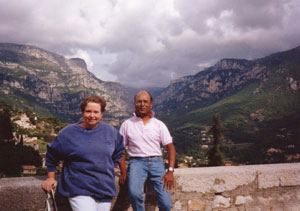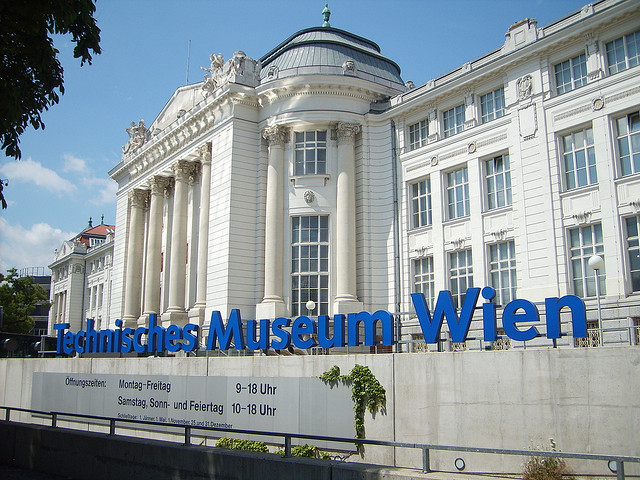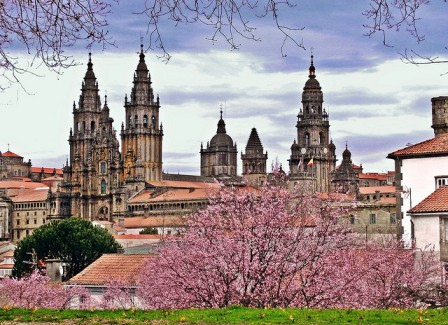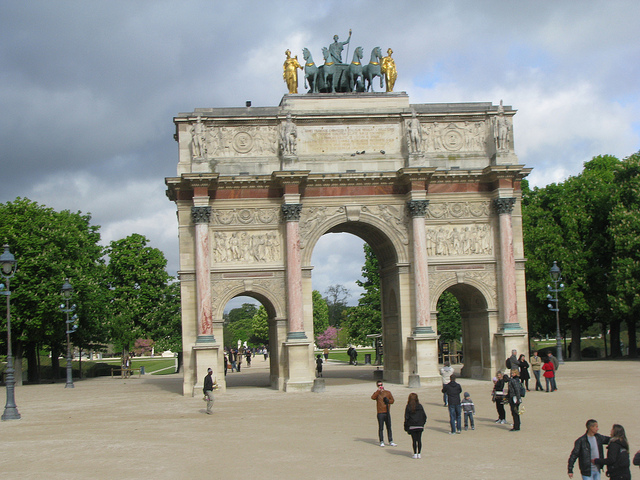8. Please talk about your interactions with the locals. Was it easy to get to know them? What about local customs, local concepts of time, boundaries, hospitality?
Dan: At first, our only connection to the locals was in shops, at the bank, and in restaurants. Our conversations were limited to the transaction at hand and maybe a brief remark or two about the weather, especially since our limited French was very rusty. We soon learned that it was polite to greet everyone you passed on the street (Bonjour, monsieur/madame), and to say hello and goodbye to everyone in the shop as you entered or left.
The books we had read about living in France said that while the French are polite, they are not easy to get to know. They rarely invite people they don’t know well to their homes, and tend to limit their social lives to established friends and family. So if we wanted to get to know people, we’d have to reach out to them.
After a couple of months, we wrote a note to our next door neighbour, Madame Schmidt, who knew Roxanne and our house very well, and invited her for afternoon tea. Her visit followed all the rules of etiquette we’d read about. She arrived promptly 15 minutes after the appointed time and brought us flowers from her garden. (Never a bottle of wine! That would be insulting.) She remained in the living room and didn’t use the powder room, wander out to the kitchen or ask for a tour of the house. She drank her tea and kept up her end of the conversation, speaking very slowly so we would understand. After one and a half hours, she said her goodbyes and left.
A couple of weeks later, she in turn invited us to her place. We too followed all the rules – but, to our delight, she did give us a tour of her house!
Judith: Later on, our book project became the main way we met people and were first invited to their homes. Several friendships resulted. Some – though not all – were more formal and limited than we’re used to. We became friends with one couple who would invite us over for drinks and serve them on the patio – we’ve never stepped inside their house! We didn’t resent this at all; we just found it interesting!
The whole subject of cultural differences is fascinating. What time to arrive for things, for example. Provençals, like many southern people, are known for being relatively casual about time. We once watched guests arriving for a wedding twenty minutes after it was supposed to begin. It didn’t matter, though, as the bride was half an hour late! But we never got it right. We’d show up for a village event right on time, then sit around – sometimes for up to an hour – before it started. The next time, we’d deliberately be fifteen minutes late and it would be all over by the time we got there.
I had the same problem with what to wear. When I showed up in my good clothes, everyone else would be in jeans. When I turned up in shorts and sandals, everyone else would be in dresses. In your own society, you usually know these things. It’s disconcerting and humbling – but also kind of fun – to have no idea!
Of course, we didn’t want to make too many faux pas. We learned from our books not to take chrysanthemums to our dinner hostess. In France, they’re strictly for graves and funerals. We learned not to offer our French guests wine except at meals, unless it was mixed with a little blackcurrant liqueur to make a kir. Champagne, however, could be served any time! We learned that every French person considers it their duty to correct your grammar and pronunciation, whereas we would never dream of correcting their mistakes in English.
Dan: One difference we never quite got used to was the reluctance of the French to offer information unless you ask directly for it, lest they insult you by assuming you are ignorant or telling you something you already know. Ask a French ticket agent if there’s a train to Lyon at 3:15 and he’ll say yes or no – but, if the answer is no, he won’t go on to tell you the schedule for other trains to Lyon, or offer the information that there is no direct train, and that you’ll have to take a train to somewhere else, then transfer. That must be why, though we regularly took Roxanne’s nine year old car in for checkups and maintenance, the garage owner never told us that all cars more than five years old are legally required to have a safety inspection and display a certificate on their windshield. Two months after we came back to Canada, the new inhabitants of Mas Ste. Anne phoned us in some dismay. They’d been stopped by the police and had to pay an enormous fine! 
“Nuages mauves”
9.You also made some connections with English-speaking expatriates.Please tell us a bit about their lifestyle,their experiences of community.
Judith: Once we’d settled into the house,we began taking French lessons at a language school,where we met some people who’d recently moved to France from England and Ireland.Through them,we discovered an English-speaking Anglican church and began attending services there.After so many months of being able to communicate with other people only in our halting and rudimentary French,it was an incredible relief to hear and speak English for that hour or two each week!
Dan: The Côte d’Azur attracts people from all over the world,and many of them are from the U.K.,USA,Canada,Australia and other English-speaking countries.Most are ordinary people living ordinary lives,going to work,church or school,raising their families,paying their mortgages,and so on.They’re just doing it in one of the most beautiful places on earth.Even if their lives seem ordinary,they tend to be interesting and adventurous people.
But the ex-pat community spans all social classes,from very humble to the rich and famous,drawn together by their common language.We met and mingled with people we’d never normally have encountered back home – artists,journalists,distinguished statesmen,highly placed government bureaucrats,a few celebrities,even one or two who were at least rogues and rascals,if not con-men or outright criminals!
Judith: We made a number of good friends among the ex-pats and most of them knew each other.That was a big change from our life in Toronto,where our friends form our own personal network,but usually haven’t met each other.Here,we see our friends individually.As a result,our social calendar is often scheduled months in advance and we may see very good friends only a few times a year.Over there,our English-speaking friends were part of a community,and it was easy to keep in touch.We saw them at church,ran into them on the street,and we all went to the same parties.We didn’t need to plan our social life in advance;it was very spontaneous.
When I decided to throw a surprise birthday party for Dan,just a week before his birthday,it took only three phone calls: two to friends,and one to the traiteur (caterer) about the food.The night of the party,almost fifty people arrived together and sang Happy Birthday outside the door.(Many of them were choir members,so they sang it in four-part harmony!) They brought the food,the wine,and the cake with them; all I had to do was pay for it.And was Dan ever surprised!
Dan: Although we loved being part of this community,we had to be careful not to let it take over our lives.It would have been easy to listen only to Riviera Radio (an English station broadcast from Monaco),read the Riviera Reporter (an English magazine for ex-pats) and imported English or American newspapers,and spend all our free time with our ex-pat friends.
We didn’t want to do that.We made a conscious effort to listen to French radio and television,read French newspapers and speak French as much as possible.We usually attended the events in our village on our own,not with English-speaking friends,so we could interact with our French acquaintances and get to know them better.We invited French people for drinks,or dinner.As a result,we managed to live in two worlds,French and English,and to enjoy them both.
10.During your stay in Provence,you started a very interesting project to profile the village that you were staying in which allowed you to meet some very interesting local people.Please tell us more about that project.
Judith: Dan loves photography.I’m a writer.So doing a book while we were in France – his photography,my writing – seemed like a natural idea.We had limited funds,and couldn’t afford to travel,so,making a virtue of necessity,we decided to concentrate on Le Bar-sur-Loup,to show,in words and pictures,the rhythms of life in this typical French village.That was what we were learning about as we lived there,and it was what I looked for,and rarely found,in the text of the many photographic books on France we’d collected over the years,long before we ever dreamed we’d live there.
Dan: With the help of a translator – so as not to miss any nuances in the answers – and a tape recorder,we interviewed around 35 people,from the mayor on down,including the village policeman,the postman,the butcher,the baker and – no,there was no candlestick maker! – shopkeepers,retired couples,expatriates,even a family from Tunisia.As people answered the questions posed by Judith and our translator,I took photographs.
On other days,Judith would be at her laptop preparing for interviews and making notes,or – later in our stay – writing the first draft.I was often out with the camera: early in the mornings or at sunset for shots of the village from across the valley,throughout the day to catch people going about their everyday life,or to get close-ups of details like doors,door-knobs,fountains and windows.I spent one night – midnight to three a.m.,and back again at six a.m.– taking pictures of the village baker and followed our olives from the trees,through harvesting,to the mill and back to our kitchen as olive oil.And of course,I took photographs of every village event!
Judith: I asked everyone we interviewed what they most liked about living in Le Bar-sur-Loup,and the answer was almost always the same,”C’est calme et tranquille.”So the title of our book is Calme & Tranquille: Rhythms of Life in a French Village.
11.What has happened to the book? Have you finished it?
Judith: No,we haven’t finished the book,though it’s getting close.When we came home ten years ago,I had written most of the first draft.We thought that we’d have the book done within months,or at most,in a year or two.In retrospect,that was naïve.
For the first three years after we got back,I missed Le Bar-sur-Loup so much that every time I tried to work on the book,I cried and couldn’t write a word.Eventually,we got the text written (a completely new rewrite),the photos selected and the book designed and laid out.We had another hiatus of several years while we supported our parents – Dan’s dad,my mother – through their final illnesses.We’re just now getting back to it and are finding that it’s pretty slow going.Other things –family,friends,work – come first.And I’m still not happy with the writing.I’m basically a how-to writer,but this book requires more evocative description and engaging story-telling.That’s a challenge for me.
Dan: It’s a bit embarrassing,especially when people from Le Bar-sur-Loup ask us where the book is.We’ve stopped making predictions about when it will be finished or how we’ll get it published.But we’re pleased with what we’ve done so far and we’re not giving up.
12.Looking back on your experience,what are your three fondest memories of your time in France? How has this experience changed you?
Judith: It’s very hard to pick just three.One of my favourite memories,because it was so unlike anything I ever imagined about life in France,was the night we attended a Christmas party for the choir that many of our English-speaking friends sang in.There we were,in France,on the Côte d’Azur,in the glamorous town of Cannes,near the Croisette,around the corner from the world-famous Carleton Hotel – and we were in a Lebanese restaurant,having dined on middle eastern kebabs and rice,singing “Johnnie,Where’s Your Troosers?” with fifty or sixty English-speaking expatriates!

Market in Grasse
Dan: For me,it was being accepted by the people in our village,even though we were still étrangers,foreigners.People called us “les Canadiens”.A lot of them knew we were working on a book about them and their village.Through the interviews,we got to know a lot of people better than we ever could have in casual conversation – and they felt they knew us too.At village events,people would invite us to sit with them.They’d kiss us hello – the ritual two-cheek greeting– in the streets.When we left,the mayor and council gave us some lovely gifts,and thanked us for the interest we’d taken in their village.Though we were there only two years,we felt we belonged.We still keep in touch with several people in the village,and many others recognize us and greet us warmly every time we return.
Judith: On the route we usually took in and out of the village,there’s one spot where,as you approach the village,you come around a curve and see Le Bar-sur-Loup perched on the hillside,the mountain rising up behind and the valley sloping off below.Every time I saw that view – and it was often several times a day – I was filled with delight,gratitude,and sheer amazement at our good fortune.Even now,ten years later,that memory brings a flood of happy feelings.
13.Making a decision to move to another country for a year or more,in mid-life,was a very courageous decision and entailed some significant sacrifices.Please comment on that and tell us what you would say to someone who is contemplating a similar decision.
Dan: Before we left,people kept telling us it was courageous,but we didn’t see it that way.We were so excited about this great adventure that it didn’t occur to us that we were being brave.How could we turn down this opportunity?
It’s only now,looking back,that we see the sacrifices we made.Because we stayed for two years,instead of the original one,our funds ran very low.We came back to our house – and our mortgage – but we had spent all of our savings and our RRSPs.
When we returned,I decided not to go back to advertising,but to work with Judith in our business,be a musician and a househusband,and try to sell my photography.We had to start again financially,with only one income,and that has been more challenging than we thought it would be.
Now,with retirement looming in a few years,we sometimes wonder if it was foolish of us to have spent all our capital in mid-life,and to have chosen self-fulfillment and following our dreams instead of a regular pay cheque.But when we think about our experiences in France and the quality of life we’ve had since our return,we realize how glad we are that we made those choices.It wouldn’t be right for everyone,but it was for us.
14.Your stay lasted about 2 years.Please describe to us your experience upon re-entry into Canadian life.
Judith: Culture shock! We weren’t prepared for that.For the first month or two,we couldn’t eat in restaurants,because it was so noisy.French people pitch their voices just to the table.Canadians – like Americans – tend to talk at full volume,so everyone in the restaurant can hear.As the din increases,people speak even louder.We couldn’t stand it.
We also missed hearing French all around us.It’s very melodic.And it’s surprisingly restful when you don’t understand what other people are saying.You can tune it out more easily.
Dan: We also found it hard to adjust to the constant barrage of advertising,both visual and aural.Billboards,magazine and newspaper ads,radio and TV commercials – never-ending.
We missed the formality of the French,the politeness of every conversational interaction.When we arrived,one suitcase didn’t arrive,and we went to the luggage counter.The clerk there was perfectly polite by Canadian standards,but he seemed rude to us as he asked,”Yes? What can I do for you?” without addressing us as Sir or Madam as he would have in France.

A brasserie in Antibes




